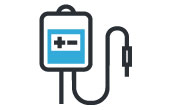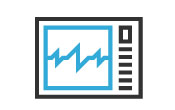Cardiac MRI
Using a non-invasive test to show detailed pictures of the inside of your heart.
Consultation
What is Cardiac MRI?
This is considered the gold standard test for assessing heart size and heart pumping function, better known as Ejection Fraction (EF).
MRI scans use magnetic energy to excite water molecules in a selected section of the body; the time taken for those water molecules to reset (different times for specific body organs) is translated into a picture of the heart on screen. Ultrasound waves (used in echocardiography) are prone to scatter as they traverse the many other structures towards the heart e.g. skin, muscle, lung, etc., thereby reducing spatial resolution compared to MRI.
This is a typical MRI image that would be obtained of your heart.
Insured?
Dr Banypersad is an authorised provider for all the major insurance companies, including BUPA (fee-assured).
All cardiac CT and MRI scans will take place at The Spire Manchester hospital.
MRI has superior spatial resolution
As a result, MRI has superior spatial resolution to echocardiograms irrespective of body shape and size. It offers limitless options for image orientation meaning a full 3D volumetric analysis can be performed for the most accurate Ejection Fraction calculation. Additionally, an intravenous dye substance (Gadolinium) is administered during cardiac MRI scans which highlights any abnormal areas in the heart.
Safe procedure
Finally, because MRI does not involve any radiation, multiple scans are safe e.g. interval monitoring of ejection fraction in patients receiving cancer therapies such as Herceptin.
Cardiac MRI scans are excellent for:
1. Assessing the extent of damaged vs normal heart muscle
2. Assessing the presence of inflammation of the heart (myocarditis
3. Assessing structural heart defects, known as cardiomyopathies, some of which can cause cardiac arrests, such as hypertrophic cardiomyopathy (HCM) and Arrhythmogenic Right Ventricular Cardiomyopathy (ARVC).
4. Assessing ischaemia (lack of adequate blood supply due to coronary artery narrowings) in the heart. This requires administration of additional medications.
Any adult patient:
- After a heart attack for the most accurate assessment of ejection fraction
- With unexplained chest pain or breathlessness to exclude heart failure or myocarditis.
- With palpitations or blackouts to exclude a cardiomyopathy
- Receiving cancer drugs / chemotherapy for regular monitoring of ejection fraction.
- With a family history of heart disease, which may be a sign of inherited cardiomyopathies.
- Requiring repeat scans as MRI carries no radiation.
- Irregular heart rhythms may yield an indeterminate scan result
- Imaging in patients with renal function eGFR < 30ml/min is generally best avoided
- Patients with any metalic implants should first seek clarification regarding their suitability
- Patients who cannot hold their breath for 5-10 seconds at a time
Tests with Dr Banypersad

Cardiac MRI
A non-invasive test that uses an MRI machine to create magnetic and radiofrequency waves to show detailed pictures of the inside of your heart.

Cardiac CT
A heart-imaging test that uses CT technology with intravenous (IV) contrast (dye) to visualize the heart anatomy, and coronary circulation.

Echocardiography
A test that uses ultrasound waves to produce live images of your heart which show how your heart and its valves are functioning.

Appointment
Dr. Banypersad's associates will help you with these tests. Through an appointment best course of action can be advised.